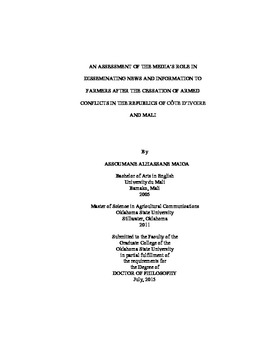| dc.contributor.advisor | Edwards, Craig | |
| dc.contributor.author | Maiga, Assoumane Alhassane | |
| dc.date.accessioned | 2016-09-29T18:41:11Z | |
| dc.date.available | 2016-09-29T18:41:11Z | |
| dc.date.issued | 2015-07 | |
| dc.identifier.uri | https://hdl.handle.net/11244/45278 | |
| dc.description.abstract | This research study followed a convergent parallel, mixed methods design. It examined and compared farmers' perceptions on the role of media and other sources in disseminating news and information after the cessation of armed conflicts in Mali and in RCI. The study involved 201 farmers who responded to a survey instrument and 10 key informant farmers who were interviewed. The quantitative findings were derived from descriptive analyzes of selected variables. Most participants were male and married, had little formal education, and farmed staple or cash crops. The key informants were similar. About four-fifths of the survey participants preferred receiving information in their local languages. They were extremely interested in receiving news and information about agriculture-related, weather forecasts, market news, and health and nutrition programs (median = 5). Most perceived the information received was extremely related to weather forecasts, market news, plant diseases, farmer interest groups, land ownership, and natural resources (median = 5). Most indicated very frequently receiving information about agriculture and food production from peer farmers and information regarding strategies for conflict resolution from extension agents and radio stations (medians = 5). A majority also said extension agents very frequently disseminated information about women and child labor in agriculture (median = 5). As a group, the participants indicated somewhat yes in regard to the information sources helping them to resume farming activities after conflict ended. The participants overall also agreed the media and other sources contributed to community resilience building. Statistically significant (p < .05) associations existed between a farmer's country of residence and their farming profession type, religious affiliation, and perceptions of how the media and other information sources helped them to resume farming or contributed to community resilience building. Six themes emerged from the interviews. More convergences than divergences were found between the views of the survey participants and the key informants. Even though the findings showed the media assisted farmers in recovering their economic livelihoods, the need existed to provide programs on other issues impacting rural communities rebuilding after armed conflicts. Differences between country groups are discussed and recommendations offered for policies, practice, and future research. | |
| dc.format | application/pdf | |
| dc.language | en_US | |
| dc.rights | Copyright is held by the author who has granted the Oklahoma State University Library the non-exclusive right to share this material in its institutional repository. Contact Digital Library Services at lib-dls@okstate.edu or 405-744-9161 for the permission policy on the use, reproduction or distribution of this material. | |
| dc.title | Assessment of the media's role in disseminating news and information to farmers after the cessation of armed conflicts in the republics of Cote d'Ivoire and Mali | |
| dc.contributor.committeeMember | Cartmell, Dwayne, | |
| dc.contributor.committeeMember | Baker, Marshall | |
| dc.contributor.committeeMember | Jenswold, Joel | |
| osu.filename | Maiga_okstate_0664D_14185.pdf | |
| osu.accesstype | Open Access | |
| dc.type.genre | Dissertation | |
| dc.type.material | Text | |
| thesis.degree.discipline | Agricultural Education | |
| thesis.degree.grantor | Oklahoma State University | |
